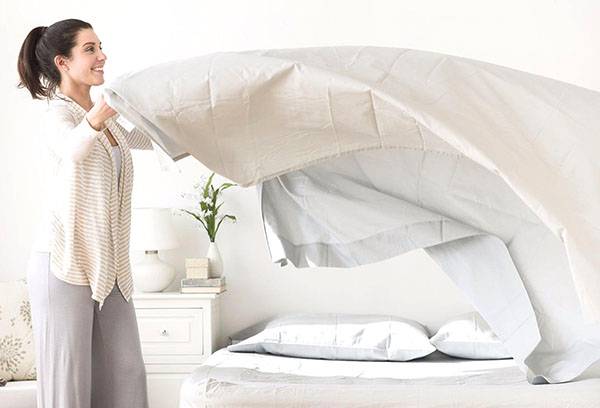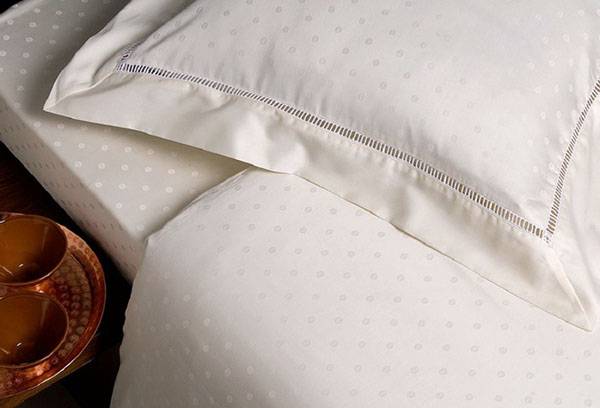How often should bed linen be changed and what are the consequences of a rare change?
Surely there was a whole chapter in the book on home economics devoted to how often to change bed linen at home: exceed the recommended period by at least a day - and you are no longer an exemplary keeper of the hearth. But how are things now? You'll be surprised, but chances are you wash your sheets, duvet covers and pillowcases a fair number of times, be it once a week or once a month.

How often is it customary to change underwear?
How is this even possible? Is there really no specific number to focus on? Why not? Ask scientists, and they will tell you that underwear needs to be changed every 7, well, maximum 10 days. At the same time, a more infrequent change of linen is shrouded in such a haze of frightening tales that, willy-nilly, you will want to change your set immediately.
So, what is the argument for such a frequent change of underwear?
- A person sleeps approximately 8 hours a day. He wears about the same amount of clothes at work or school. Wearing the same sweater for 2 weeks in a row is beyond the bounds of public decency, which means your underwear needs to be changed just as often.
- Dead cells accumulate on the bed, which can attract bedbugs, the presence of which you will not be happy with.
- The fat that is secreted through the sebaceous glands becomes increasingly difficult to wash off over time: even “Whiteness” does not help remove old yellow stains on pillows.
- During sleep, a person sweats, releasing a total of up to a liter of fluid per night.Who wants to sleep on a sweat-soaked sheet or pillowcase?
- Sweat, oil, and dead skin cells cause odor that can interfere with your ability to enjoy healthy, quality sleep. Still, it’s easier to sleep in a fresh crib.
- Dirt that accumulates on sheets and duvet covers promotes the growth of bacteria and fungi, which are not so easy to remove with washing.
- Dust and dirt on bedding can aggravate some chronic respiratory conditions, such as asthma.
By the way
The hotter the washing water, the more germs and bacteria will be killed. So, in most machines, the “cotton” mode at 90˚C is provided specifically for washing clothes, and not so long ago, sheets and pillowcases were generally boiled in large pans. However, not all modern linen can be washed at 90˚C due to the rapid wear of bedding: we recommend that you always determine What mode should I use to wash bed linen? from various materials on the kit labels.
It sounds like it's time to drop everything and urgently do the laundry that you laid out 11 days ago. Then why - and here you will probably recognize yourself - a minimum number of people are not lazy to change their sets weekly, while the majority delays washing for up to two weeks, and sometimes even a month?
How often should you change your underwear really?
Have you ever heard of a person coming down with an incurable disease because he didn't wash his clothes for too long? Hardly.Some individuals - let's be honest, mostly bachelors - manage to use the same set for months and still feel great! So how often should you change your bed linens at home? Unfortunately, it will not be possible to voice a specific figure, because it depends on many factors.
- Some people tend to sweat and produce more sebum than others. In this case, the bed will get dirty noticeably faster, and you will have to refresh it (in order to prevent the appearance of yellow spots and an unpleasant odor) much more often.
- But even if you sweat a lot and have oily skin, you can sleep with or without pajamas. In the first case, the nightgown will take on some of the dirt, so the linen will not get dirty as quickly as in the second case.
- If you are insensitive to dust and its presence under cabinets and on shelves does not seriously poison your life, then dust on your laundry is unlikely to trigger an asthma attack.
- While it's a good idea to be wary of mildew, most bacteria on your sheets won't harm you.
By the way
If you're debating whether or not to iron your clothes after washing, be guided by your level of germ anxiety and your willingness to put up with wrinkles and wrinkles in your sheets and duvet covers.
- There is a 99.9% chance that microscopic mites are already living in your mattress, and this is normal. If an allergic reaction to their waste products has not yet manifested itself in the form of a runny nose or itching, then, apparently, you are insensitive to them.
- The sweat that the body produces accumulates not so much in the sheets as in the pillows and mattress, and regular cleaning of them is forgotten much more often than changing the sheets.But it is recommended to clean pillows, blankets and mattresses at least once every six months!
- But the most important factor that will help you decide how often you need to change your bed linen at home is your feelings. How clean are you on a scale from a germaphobe to a person who basically doesn't notice the trash around? In the first case, you won’t last even five days on stale sheets, and in the second, someone will definitely be horrified by your housekeeping skills. There is nothing good in both extremes, but the golden mean here is difficult to measure down to the day. It could be a week, two, four, or maybe even eight.
Advice
Although most of the bacteria living on your bedding are harmless, it is a good idea to use bleach or other detergent when washing. disinfectants.
We are in no way encouraging you to become slobs: it is still difficult to find an excuse for unwashed laundry for six months. But even within normal limits, each person has his own ideas about cleanliness and dirt, and in most cases this has an insignificant effect on the state of health, which is so popular in various studies.
It is unlikely that anyone will dare to admit that they wash their clothes once every month or two: the fear of public censure is too great. But in reality, such a frequency of changing sets does not make you an incorrigible slob, and certainly does not endanger your health. As long as you are comfortable sleeping on this sheet and you do not feel that stale linen is somehow affecting your well-being, the only person whose opinion you should care about is your significant other, whose concept of cleanliness and comfort can different from yours.

